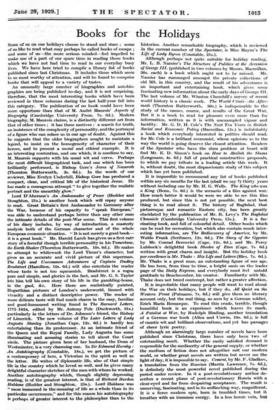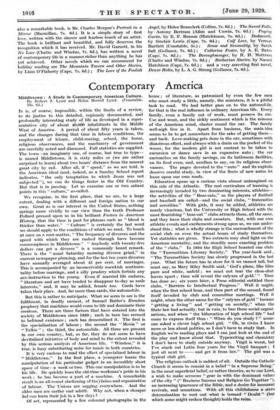Books for the Holidays
Sons of us on our holidays choose to stand and stare ; some of us like to read what may perhaps be called books of escape ; and some of us—the more serious minded—feel impelled to make use of a part of our spare time in reading those books which we have not had time to read in our everyday busy lives. We have here tried to compile a library list of books published since last Christmas. It includes those which seem to us most worthy of attention, and will be found to comprise books that will appeal to a variety of tastes.
An unusually large number of biographies and autobio- graphies are being published to-day, and it is not surprising, therefore, that the most interesting books which have been reviewed in these columns during the last half-year fall into this category. The publication of no book could have been more opportune than that of M. Andre Maurois' Aspects of Biography (Cambridge University Press, 7s. 6d.). Modern biography, M. Maurois claims, is a distinctly different art from that of other times ; it has three motives : a search for truth, an insistence of the complexity of personality, and the portrayal of a figure who can solace us in our age of doubt. Against this he suggests that the older biographers sought to maintain a legend, to insist on the homogeneity of character of their heroes, and to present a moral and ethical example. It is an interesting contention, and one which, it is needless to say, M. Maurois supports with his usual wit and verve. Perhaps the most difficult biographical task, and one which has been brilliantly performed, is Bishop Gore's Jesus of Nazareth (Thornton Butterworth, 2s. 6d.). In the words of our reviewer, Miss Evelyn Underhill, Bishop Gore has produced a compact, clear, and critical life of the historical Jesus. He has made a courageous attempt " to give together the realistic portrait and the unearthly glow."
Lord D'Abernon's An Ambassador of Peace (Hodder and Stoughton, 2Is.) is another book which will repay anyone to read. Great Britain's first Ambassador to Germany after the War, because of his capacity to " speak European," was able to understand perhaps better than any other man the intimate details of the post-War scene. This first volume of his diary includes, by way of introduction, a masterly analysis both of the German character and of the whole European economic situation. " It is not merely a good book— it is a great book." Mr. Harold Lamb has given us a first-rate story of a forceful though terrible personality in his Tamerlane, the Earth Shaker (Thornton Butterworth, 10s. 6d.). He makes no attempt to whitewash the Lord Timur's character, but gives us an accurate and vivid picture of this superman. The Life and Uncommon Adventures of Captain Dudley Bradstreet (Hamilton, 10s. 6d.) will also entertain the reader whose taste is not too squeamish. Bradstreet is a rogue pure and simple, and glories in the fact, and Mr. G. S. Taylor lets him tell his own story of his life in the gambling-house, in the gaol, &c. Here there are realistically painted, Ilogarthian pictures of London's underworld, limned with vivacity and a distinct descriptive power. The reader of more delicate taste will find much charm in the easy, familiar and good-humoured writing found in The Barnard Letters, 1775 -1824, edited by Mr. Antony Pole (Duckworth, 21s.) particularly in the letters of Dr. Johnson's friend, the Bishop of Limerick. The new volume of The Later Letters of Lady Augusta Stanley (Jonathan Cape, 12s. 6d.) is hardly less entertaining than its predecessor. As an intimate friend of the Queen and the Royal Family, Lady Augusta has some illuminating and amusing stories to tell about the Court circle. The picture given here of her husband, the Dean of Westminster, is a very charming one. In Sir Edmund Hornby : An Autobiography (Constable, 18s.), we get the picture of a contemporary of hers, a Victorian in the spirit as well as the letter. He writes of diplomatic life, also of that simple life in the country which he loved so well, and he gives many delightful character sketches of the men with whom he worked. Another autobiography which, though slightly depressing reading, is of the greatest interest, is that of Richard Burdon Haldane (Hodder and Stoughton, 25s.). Lord Haldane was " more immersed in the meaning of life as a whole than in its particular occurrences," and for this reason his autobiography is perhaps of greater interest to the philosopher than to the
historian. Another remarkable biography, which is reviewed in the current number of the Spectator, is Miss Mayne's The Life of Lady Byron (Constable, 21s.). Although perhaps not quite suitable for holiday reading, Mr. L. B. Namier's The Structure of Politics at the Accession of George III. (published in two volumes by Messrs. Macmillan, 30s. each) is a book which ought not to be missed. Mr. .Namier has rummaged amongst the private collections of old MS. in this country, and the result of his adventures is an important and entertaining book, which gives some fascinating new information about the early days of George The last volume of Mr. Winston Churchill's survey of recent world history is a classic work. The World Crisis—the After- math (Thornton Butterworth, 30s.) is indispensable to the study of the causes, course, and results of the Great War. But it is a book to read for pleasure even more than for information, written as it is with unexampled vigour and lucidity. Mr. G. D. H. Cole's The Next Ten Years in British Social and Economic Policy (Macmillan, 15s.) is indubitably a book which everybody interested in politics should read, for Mr. Cole is a brilliant economist, whose opinions as to the way the world is going deserve the closest attention. Readers of the Spectator who have the slum problem at heart will find Mr. E. D. Simon's book on How to Abolish the Slums (Longman, 4s. 6d.) full of practical constructive proposals, to which we pay tribute in a leading article this week. It is, without doubt, the most dispassionate study of this subject which has yet been published.
It is impossible to recommend any list of books published within any six months for the last (shall we say ?) thirty years without including one by Mr. H. G. Wells. The King who was a King (Benn, 7s. 6d.) is the scenario of a film against war. How much better it would be were we able to see this film produced, but since this is not yet possible, the next best thing is to read about it. The history of Baghdad, that picturesque and romantic Eastern city, has been greatly elucidated by_the publication of Mr. R. Levy's The Baghdad Chronicle (Cambridge University Press, 15s.). It is a fas- cinating book, and full of colourful detail. Other books which can be read for recreation, but which also contain much inter- esting information, are The Rediscovery of America, by Mr. Waldo Frank (Scribners, 12s. (kl.), The Story of the Gypsies by Mr. Conrad Bercovici (Cape, 12s. 6d.), and Mr. Percy Lubbock's delightful book Shades of Eton (Cape, Is. 6d.) written with great charm and insight. But the holiday book par excellence is Mr. Thake : His Life and Letters (Bles, 7s. 6d.). Mr. Thake is a great man, an outstanding figure of our age. He has been, from time to time, a bright oasis on the leader page of the Daily Express, and everybody must feel untold gratitude to Beachcomber, his creator. Familiarity with Mr. Thake does not breed contempt, but rather a greater affection.
It is improbable that many people will want to read about the War on their holidays, but if they do, All Quiet on the Western Front (Putnams, 7s. 6d.) will give them no literary account only, but the real thing, as seen by a German soldier, Erich Maria Rernarque. To read this crude, terrible, though beautiful book is an experience which leaves its mark. A Fatalist at War, by Rudolph Binding, another translation of a German war book (Allen and Unwin, 10s. 6d.), is full of caustic wit and brilliant observations, and yet has passages of sheer lyric poetry.
Although an alarmingly large number of novels have been published since Christmas, there have only been two of outstanding merit. Whether the easily satisfied demand is responsible for the mediocrity of the general supply, or whether the medium of fiction does not altogether suit our modern world, or whether great novels are written but never see the light of day, it is impossible to say. Cement, by Mr. F. Gladkov, a translation from the Russian (Martin Lawrence, 7s. 6d.), is definitely the most powerful novel published during the period under review. In it a post-revolutionary author de- scribes a recent phase of post-revolutionary Russia with a clear-eyed and far from despairing acceptance. The result is unnerving, fascinating, and in its unflinching way, magnificent. It is a fierce modern epic, born in troubled times, but it breathes with an immense energy. In a less heroic vein, but also a remarkable book, is Mr. Charles Morgan's Portrait in a Mirror (Macmillan, 7s. 6d.). It is a simple story of -first love, written with the sincere and fearless touch of an artist. The book is brilliant and beautiful, and fully deserves the recognition which it has received. Mr. David Garnett, in his No Love-(Chatto and Windus, 7s. 6d.), has written a novel of contemporary life in a manner richer than anything he has yet achieved. Other novels which we can recommend for holiday reading are The Mountain Tavern and Other Stories, by Liam O'Flaherty (Cape, 7s. 6d.) ; The Love of the Foolish Angel, by Helen Beauclerk (Collins, 7s. 6d.) ; The Sword Falls, by ..Antony Bertram (Allen and Unwin, 7s. 6d.) ; Paying Guests, by E. F. Benson (Hutchinson, 7s. 6c1.) ; Dodsworth, by Sinclair Lewis (Cape, 7s. 6d.) ; Calf Love, by Vernon Bartlett (Constable, 5s.) ; Sense and Sensuality, by Sarah Salt (Gollancz, 7s. 6d.) ; Catherine Foster, by A. E. Bates (Cape, 7s. 6d.) ; The Boroughmonger, by R. H. Mottram (Chatto and Windus, 7s. 6d.) ; Barbarian Stories, by Naomi Hutchison (Cape, 7s. 6d.) ; and a very arresting first novel, Dewar Rides, by L. A. G. Strong (Gollancz, 7S. 6d.).









































 Previous page
Previous page